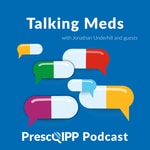Talking Meds - A PrescQIPP podcast – Details, episodes & analysis
Podcast details
Technical and general information from the podcast's RSS feed.

Talking Meds - A PrescQIPP podcast
PrescQIPP C.I.C.
Frequency: 1 episode/14d. Total Eps: 24

Engaging conversations about medicines-related dilemmas.
Talking Meds is hosted by Jonathan Underhill who, every two weeks, will chat to a fantastic guest about current medical issues and clinical dilemmas.
Jonathan has a background as a hospital clinical pharmacist but worked for many years at the National Prescribing Centre (NPC) developing innovative ways of teaching therapeutics, evidence-based medicine and clinical decision making to prescribers and their support teams. Until recently, he worked at NICE as a consultant clinical adviser in their Medicines Optimisation Team. He is now Medicines Clinical Adviser at PrescQIPP.
Jonathan and his guests will discuss topics such as new guidance from NICE on menopause, asthma, depression deprescribing and insomnia; how to tackle penicillin allergy de-labelling.
There will also be a series on ’Sensible prescribing in Older people with Jonathan and Lucy’, with consultant geriatrician and author Lucy Pollock.
PrescQIPP is a Community Interest Company. We operate on a not-for-profit basis for the benefit of NHS patients and organisations and help NHS organisations to improve medicines-related care to patients. Find out more here: https://www.prescqipp.info/
Recent rankings
Latest chart positions across Apple Podcasts and Spotify rankings.
Apple Podcasts
🇬🇧 Great Britain - medicine
01/08/2025#41🇬🇧 Great Britain - medicine
30/07/2025#87🇬🇧 Great Britain - medicine
29/07/2025#46🇬🇧 Great Britain - medicine
02/07/2025#56🇬🇧 Great Britain - medicine
10/05/2025#76🇬🇧 Great Britain - medicine
02/05/2025#68🇬🇧 Great Britain - medicine
01/05/2025#37🇬🇧 Great Britain - medicine
30/04/2025#38🇬🇧 Great Britain - medicine
29/04/2025#86🇬🇧 Great Britain - medicine
28/04/2025#82
Spotify
No recent rankings available
Shared links between episodes and podcasts
Links found in episode descriptions and other podcasts that share them.
See all- https://www.radicalcandor.com/
171 shares
- https://www.prescqipp.info/
45 shares
RSS feed quality and score
Technical evaluation of the podcast's RSS feed quality and structure.
See allScore global : 72%
Publication history
Monthly episode publishing history over the past years.
1. A day in the life of a primary care based clinical pharmacist with Magnus Hird
Season 1 · Episode 1
vendredi 20 septembre 2024 • Duration 29:39
Welcome to the first episode of Talking Meds and the PrescQIPP podcast, engaging conversations about medicines-related dilemmas. Today, your host Jonathan Underhill, Medicines Clinical Adviser at PrescQIPP, talks to Magnus Hird about his role, how he prioritises people for medication review as well as two current safety issues that have recently been in the news.
Magnus is a pioneer of clinical pharmacists working in General Practice and one of the first ever pharmacist independent prescribers. He was one of the first cohort of NPC Trainers, running educational events in the North West. He now works 2 days per week in a busy general practice in Blackpool, with the rest of his week occupied as clinical lead for ambulance commissioning, covering the 999 paramedic emergency service, NHS111 and patient transport services across the northwest, and as a clinical advisor for urgent care to the NHS England regional team. He also runs a smallholding farm in the North West of England (follow his antics on various social media outlets via https://sites.google.com/view/monkhallfarm/home
Jonathan and Magnus discuss what a typical day in general practice could look like for Magnus, how he prioritises his workload, deals with complexity and what particular skills a clinical pharmacist brings to the primary care team.
Useful sources discussed include:
PINCER - Pharmacist-led Information technology iNtervention for the reduction of Clinically important ERrors in medicines management
https://healthinnovationwessex.org.uk/projects/56/pincer
Estimating the economic effect of harm associated with high risk prescribing of oral non-steroidal anti-inflammatory drugs in England: population based cohort and economic modelling study. BMJ 2024;386:e077880
https://www.bmj.com/content/386/bmj-2023-077880
Asthma: effect of excess short-acting β2-agonist (SABA) inhaler prescriptions on healthcare resource utilisation
Mark L Levy, Toby GD Capstick and Thomas Antalffy
British Journal of General Practice 2024; 74 (745): 374-376.
https://doi.org/10.3399/bjgp24X739089
NICE Guideline - Asthma: diagnosis, monitoring and chronic asthma management (Expected publication date: 27 November 2024)
https://www.nice.org.uk/guidance/gid-ng10186/documents/450
Useful PrescQIPP resources (need to be registered and logged into the website to access):
Asthma bulletin 251
https://www.prescqipp.info/our-resources/bulletins/bulletin-251-asthma/
PrescQIPP Asthma e-learning course (pay per use)
A new episode of Talking Meds will be available every other Friday.
If you have feedback or suggestions for future topics and guests please submit them to talkingmeds@prescqipp.info
PrescQIPP is funded by the NHS for the NHS, and our aim is to improve medicines-related care for patients. We do this by producing high quality evidence-based resources and training, and by facilitating networks between NHS organisations and professionals.
The majority of pharmacists and other healthcare professionals across the UK can access our resources by registering and logging on to our website. If you have any difficulty accessing the website you can email help@prescqipp.info and we’ll aim to sort things out for you.
Find out more about PrescQIPP here
Talking Meds - Engaging conversations about medicines-related dilemmas
Season 1 · Episode 1
jeudi 29 août 2024 • Duration 01:51
We are excited to share a clip of our new podcast, 'Talking Meds' with our host Jonathan Underhill and guests, which launces on 20 September.
Talking Meds will be available to listen to via your usual podcast system and a new episode will come out every fortnight, on the first and third Friday of each month.
Jonathan Underhill has a background as a hospital clinical pharmacist but worked for many, many years at the National Prescribing Centre (NPC) developing innovative ways of teaching therapeutics, evidence-based medicine and clinical decision making to prescribers and their support teams. Until recently, he worked at NICE as a consultant clinical adviser in their Medicines Optimisation Team.
Episode 1 launches on Friday 20th September and features guest Magnus Hird to discuss his role, how he prioritises people for medication review as well as two current safety issues that have recently been in the news.
Magnus is a pioneer of clinical pharmacists working in General Practice and one of the first ever pharmacist independent prescribers. He was one of the first cohort of NPC Trainers, running educational events in the North West. He now works two days per week in a busy general practice in Blackpool, with the rest of his week occupied as clinical lead for ambulance commissioning, covering the 999 paramedic emergency service, NHS111 and patient transport services across the northwest, and as a clinical advisor for urgent care to the NHS England regional team. He also runs a smallholding farm in the North West of England (follow his antics on various social media outlets via https://sites.google.com/view/monkhallfarm/home)
Future episodes
- A series on ’Sensible prescribing in Older people with Jonathan and Lucy’, with consultant geriatrician and author Lucy Pollock
- Penicillin allergy de-labelling with Phil Howard OBE
- New NICE Menopause guideline with NICE committee member Hayley Berry
- As well as topics such as the NICE/SIGN Asthma guideline, depression deprescribing and insomnia
So subscribe now to make sure you don't miss an episode.
A new episode of Talking Meds will be available every other Friday.
If you have feedback or suggestions for future topics and guests please submit them to talkingmeds@prescqipp.info
PrescQIPP is funded by the NHS for the NHS, and our aim is to improve medicines-related care for patients. We do this by producing high quality evidence-based resources and training, and by facilitating networks between NHS organisations and professionals.
The majority of pharmacists and other healthcare professionals across the UK can access our resources by registering and logging on to our website. If you have any difficulty accessing the website you can email help@prescqipp.info and we’ll aim to sort things out for you.
Find out more about PrescQIPP here
2. Sensible prescribing in older people with Jonathan and Lucy; Prescribing cascades
Season 1 · Episode 2
vendredi 4 octobre 2024 • Duration 15:06
Welcome to the 2nd episode of Talking Meds and the PrescQIPP podcast, engaging conversations about medicines-related dilemmas.
Today your host Jonathan Underhill, Medicines Clinical Adviser at PrescQIPP, introduces a new series within the Talking Meds podcast called ‘Sensible prescribing in Older people with Jonathan and Lucy’. Jonathan and Dr Lucy Pollock outline their plan to share some real patient stories that may help us think about how to ensure we consider what really matters to patients when we are reviewing their medicines.
Lucy grew up in Northern Ireland, read medicine at Cambridge University and St Bartholomew’s Hospital and is eternally grateful for the advice of an early boss who hoped she would not be offended if he suggested she should become a geriatrician. She trained in general and geriatric medicine in London before taking up a consultant post in Somerset in 2001. She lives with her husband and dog Rose near Langport. They have three grown-up children.
Lucy writes about her patients, their families and the complicated, funny, sad problems that arise as we age. The Book About Getting Older (2021) and The Golden Rule (2024) are both published by Penguin Random House. @lucypollock | Linktree
In this episode, Jonathan and Lucy talk how about we need to be really careful when starting some medicines, making sure we are considering some of the potential, perhaps unintended consequences. Lucy tells about her experiences where sometimes the very best of intentions to try and help treat symptoms may lead to ‘prescribing cascades’ and how tricky that can be for our patients.
Useful sources referred to in this episode include:
Introduction to ‘prescribing cascades’ from Canadian Medication Appropriateness and Desprescribing Network: https://www.deprescribingnetwork.ca/blog/prescribing-cascade
BMJ Open Adverse drug reactions, multimorbidity and polypharmacy: a prospective analysis of 1 month of medical admissions
https://bmjopen.bmj.com/content/bmjopen/12/7/e055551.full.pdf
Useful PrescQIPP resources (need to be registered and logged into the website to access):
Polypharmacy and deprescribing webkit
https://www.prescqipp.info/our-resources/webkits/polypharmacy-and-deprescribing/
IMPACT Bulletin 268
https://www.prescqipp.info/our-resources/bulletins/bulletin-268-impact/
Clinical Masterclasses on Multimorbidity, Frailty and Polypharmacy in Older People
https://www.prescqipp.info/our-resources/clinical-webinars/clinical-masterclass-dec-2021/
A new episode of Talking Meds will be available every other Friday.
If you have feedback or suggestions for future topics and guests please submit them to talkingmeds@prescqipp.info
PrescQIPP is funded by the NHS for the NHS, and our aim is to improve medicines-related care for patients. We do this by producing high quality evidence-based resources and training, and by facilitating networks between NHS organisations and professionals.
The majority of pharmacists and other healthcare professionals across the UK can access our resources by registering and logging on to our website. If you have any difficulty accessing the website you can email help@prescqipp.info and we’ll aim to sort things out for you.
Find out more about PrescQIPP here
3. Safely stopping antidepressants with Dr Mark Horowitz
Season 1 · Episode 3
vendredi 18 octobre 2024 • Duration 37:28
Welcome to the latest episode of Talking Meds and the PrescQIPP podcast, engaging conversations about medicines-related dilemmas.
Today Jonathan Underhill, Medicines Clinical Adviser at PrescQIPP, talks to Dr Mark Horowitz about how to safely stop antidepressants and the importance of tapering dose reduction slowly to reduce the risk of withdrawal symptoms.
Dr Mark Horowitz is a training psychiatrist and Visiting Lecturer in London, and the lead author of the Maudsley Deprescribing Guidelines (see below). Mark co-authored the recent Royal College of Psychiatrists’ guidance on ‘Stopping Antidepressants’, and has been commissioned by Health Education England to prepare a teaching module on how to safely stop antidepressants for the NHS (coming soon!).
Mark has experienced the difficulty of coming off psychiatric medications first hand which has informed much of his work.
Useful sources referred to in this episode include:
Dose response curves/Law of Mass action illustrated here (see figure 1)
The Maudsley Deprescribing Guidelines: Antidepressants, Benzodiazepines, Gabapentinoids and Z-drugs
RPS members can get free access to the Maudsley Deprescribing Guidelines here:
https://www.vlebooks.com/Account/Logon/RPS
Maudsley Prescribing Guidelines
The Maudsley Prescribing Guidelines in Psychiatry eBook
Register for an NHS England OpenAthens account.
NICE guidelines
NICE guideline on depression in adults – see section 1.4.12 to 1.4.21 for information on stopping antidepressants.
NICE guideline on medicines associated with dependence or withdrawal symptoms - further recommendations on withdrawing antidepressants.
Clinical Knowledge Summary (CKS)
A new episode of Talking Meds will be available every other Friday.
If you have feedback or suggestions for future topics and guests please submit them to talkingmeds@prescqipp.info
PrescQIPP is funded by the NHS for the NHS, and our aim is to improve medicines-related care for patients. We do this by producing high quality evidence-based resources and training, and by facilitating networks between NHS organisations and professionals.
The majority of pharmacists and other healthcare professionals across the UK can access our resources by registering and logging on to our website. If you have any difficulty accessing the website you can email help@prescqipp.info and we’ll aim to sort things out for you.
Find out more about PrescQIPP here
4. Sensible prescribing in older people with Jonathan and Lucy; Weighing up the benefits and harms of treatments
Season 1 · Episode 4
vendredi 1 novembre 2024 • Duration 14:15
Welcome to the latest episode of Talking Meds and the PrescQIPP podcast, engaging conversations about medicines-related dilemmas.
Today, your host Jonathan Underhill, Medicines Clinical Adviser at PrescQIPP, continues the series within the Talking Meds podcast called ‘Sensible prescribing in Older people with Jonathan and Lucy’.
Jonathan and Lucy discuss Brenda, an older lady who has become frail and has significant dementia that is affecting her ability to cope with everyday life and living. She has been taking aspirin, originally intended to reduce her risk of a further heart attack, but which hasn’t been thought about for a while. They discuss how clinicians are prone to overestimate benefits of medicines, but underestimate harms. The importance of finding out a patient’s (and their carer’s) expectations are key to sensible prescribing. Sometimes the tablets aren’t worth our precious older people taking them, as the harms may well outweigh the potentially small benefits.
Resources mentioned in this episode include:
GPs’ understanding of the benefits and harms of treatments for long-term conditions: an online survey. Julian Treadwell in British Journal of General Practice. https://bjgpopen.org/content/4/1/bjgpopen20X101016
A brilliant resource to help illustrate likely benefits and harms for some commonly used medicines - GP Evidence https://gpevidence.org/
PrescQIPP webinar recording. How well do GPs understand the benefits and harms of treatments for long term conditions?
Dr Julian Treadwell.
https://www.prescqipp.info/our-resources/clinical-webinars/how-well-do-gps-understand-the-benefits-and-harms-of-treatments-for-long-term-conditions/
A new episode of Talking Meds will be available every other Friday.
If you have feedback or suggestions for future topics and guests please submit them to talkingmeds@prescqipp.info
PrescQIPP is funded by the NHS for the NHS, and our aim is to improve medicines-related care for patients. We do this by producing high quality evidence-based resources and training, and by facilitating networks between NHS organisations and professionals.
The majority of pharmacists and other healthcare professionals across the UK can access our resources by registering and logging on to our website. If you have any difficulty accessing the website you can email help@prescqipp.info and we’ll aim to sort things out for you.
Find out more about PrescQIPP here
5. The new repeat prescribing toolkit from RPS/RCGP with Clare Howard
Season 1 · Episode 5
vendredi 15 novembre 2024 • Duration 26:13
Welcome to the latest episode of Talking Meds on the PrescQIPP podcast, engaging conversations about medicines-related dilemmas.
Today, your host Jonathan Underhill talks to Clare Howard, Clinical Lead for Medicines Optimisation at Health Innovation Wessex, about the development of the Repeat Prescribing Toolkit she led on behalf of the Royal Pharmaceutical Society and Royal College of General Practitioners.
The toolkit was commissioned by NHS England in answer to recommendation 7 of the National Overprescribing Review, to help practices improve the consistency of their repeat prescribing processes. There are 1.18 billion medicines prescribed and dispensed in Primary Care in England each year. While most people get their medicines without any issues, there are around 20-30,000 ‘probable avoidable’ harm incidents each year, of which around a quarter are related to medicines. Clare and Jonathan discuss the multiple ways this toolkit can help reduce the risk of these errors.
The NHS is a complex system, and repeat prescribing is a ‘WICKED’ problem (difficult or impossible to fix) as it involves human to human interactions. Clare and Jonathan acknowledge that while you can’t ‘fix’ it and completely prevent any errors, having a structured approach can help reduce the risk of those errors and make for a more efficient process (and happier patients and healthcare staff!)
Resources mentioned in this episode include:
Repeat Prescribing Toolkit:
https://www.rpharms.com/resources/repeat-prescribing-toolkit
National Polypharmacy Programme from Wessex Health Innovation Network
https://thehealthinnovationnetwork.co.uk/programmes/medicines/polypharmacy
Get details of upcoming ALS cohorts and book your place here.
Useful related resources from PrescQIPP:
The PrescQIPP 'Practice Medicines Coordinators' e-learning course is recommended as a training resource for prescription clerks in the RPS/RCGP Repeat Prescribing Toolkit.
PrescQIPP Practice Medicines Coordinators e-learning course (Pay per use)
PrescQIPP Bulletin 325: Empowering patients to manage their repeat prescriptions
PrescQIPP Bulletin 292: Repeat prescriptions
A new episode of Talking Meds will be available every other Friday.
If you have feedback or suggestions for future topics and guests please submit them to talkingmeds@prescqipp.info
PrescQIPP is funded by the NHS for the NHS, and our aim is to improve medicines-related care for patients. We do this by producing high quality evidence-based resources and training, and by facilitating networks between NHS organisations and professionals.
The majority of pharmacists and other healthcare professionals across the UK can access our resources by registering and logging on to our website. If you have any difficulty accessing the website you can email help@prescqipp.info and we’ll aim to sort things out for you.
Find out more about PrescQIPP here
6. Sensible prescribing in older people with Jonathan and Lucy; Heart failure with preserved ejection fraction
Season 1 · Episode 6
vendredi 29 novembre 2024 • Duration 22:08
Welcome to the latest episode of Talking Meds on the PrescQIPP podcast, engaging conversations about medicines-related dilemmas. Today, your host Jonathan Underhill, Medicines Clinical Adviser at PrescQIPP, continues the series within the Talking Meds podcast called ‘Sensible prescribing in Older people with Jonathan and Lucy’.
Today, Jonathan and Lucy talk about the identification AND sensible management of heart failure with preserved ejection fraction. They discuss how we need to have a different approach than that for heart failure where the ejection fraction is reduced by a significant amount. But that the key is to consider what matters most to people and tailor our approach accordingly. Its guidelines not tramlines!
The importance of ‘sick day rules’ are also discussed – stopping medicines for a short period where volume depletion or a urinary tract infection (UTI) is present.
We also meet Marjory, who has recently been started on dapagliflozin but is admitted to hospital with a raging UTI and delirium. The EMPORER study found that for every 100 people on a flozin, one of them would get a UTI due to the flozin. But this risk may be higher in older people as they are at higher risk of this happening in the first place than those included in the EMPORER study. Medicine is tricky eh?
See the tab for HFPrEF in GP Evidence https://gpevidence.org/ to illustrate this with icon arrays.
Resources mentioned in this episode include:
P Moorhouse, K Rockwood. Frailty and its quantitative clinical evaluation
National Institute for Health and Care Excellence. Urinary tract infection (lower): antimicrobial prescribing
NICE guideline [NG109]Published: 31 October 2018
PrescQIPP bulletin 347. Chronic Heart Failure
PrescQIPP e-learning. Chronic Heart Failure in Adults (pay per use)
A new episode of Talking Meds will be available every other Friday.
If you have feedback or suggestions for future topics and guests please submit them to talkingmeds@prescqipp.info
PrescQIPP is funded by the NHS for the NHS, and our aim is to improve medicines-related care for patients. We do this by producing high quality evidence-based resources and training, and by facilitating networks between NHS organisations and professionals.
The majority of pharmacists and other healthcare professionals across the UK can access our resources by registering and logging on to our website. If you have any difficulty accessing the website you can email help@prescqipp.info and we’ll aim to sort things out for you.
Find out more about PrescQIPP here
7. Update to the NICE guideline on menopause with Hayley Berry
Season 1 · Episode 7
vendredi 13 décembre 2024 • Duration 30:04
Welcome to the latest episode of Talking Meds and the PrescQIPP podcast, engaging conversations about medicines-related dilemmas. Today, your host Jonathan Underhill, Medicines Clinical Adviser at PrescQIPP, talks to Hayley Berry about the update to the NICE Guideline on the identification and management of the menopause, published in November 2024.
Hayley has a background in community pharmacy and general practice and now works for CPPE at the University of Manchester as a Lead learning development pharmacist. As a pharmacist independent prescriber, she works at a private menopause clinic and was a member of the NICE Menopause guideline development committee.
Jonathan and Hayley discuss the important aspects of the update and touch on some of the somewhat controversial issues that surround this subject. The choice about whether to take HRT or not is a highly preference sensitive decision, where the values and preference of each woman needs to be taken into account. They discuss the various tools available to help facilitate those conversations, particularly the discussion tool published by NICE to accompany the guideline update, as well as the excellent GP Evidence website and the upcoming patient decision aid being developed by the Winton Centre.
They also discuss the research recommendations within the guideline, highlighting how relatively poor the existing evidence base is for the management of the menopause.
Resources mentioned in this episode include:
NICE Guideline on Menopause: identification and management. NG 23 – updated November 2024
Tools from NICE to communicate the benefits and risks of HRT
GP Evidence has summarised the evidence on the benefits and risks of HRT for menopause.
NICE CKS Menopause topic (excellent for a quick summary of the guidance)
Useful related resources from PrescQIPP:
PrescQIPP Bulletin 299. Menopause
PrescQIPP Clinical Masterclass on 29th January 2025 on the NICE Menopause Guideline
A new episode of Talking Meds will be available every other Friday.
If you have feedback or suggestions for future topics and guests please submit them to talkingmeds@prescqipp.info
PrescQIPP is funded by the NHS for the NHS, and our aim is to improve medicines-related care for patients. We do this by producing high quality evidence-based resources and training, and by facilitating networks between NHS organisations and professionals.
The majority of pharmacists and other healthcare professionals across the UK can access our resources by registering and logging on to our website. If you have any difficulty accessing the website you can email help@prescqipp.info and we’ll aim to sort things out for you.
Find out more about PrescQIPP here
8. Festive prescribing in older people with Jonathan and Lucy; Treatment breaks
Season 1 · Episode 8
vendredi 27 décembre 2024 • Duration 18:05
Welcome to this special festive edition of Talking Meds and the Presqipp podcast, engaging conversations about medicines-related dilemmas. Today, your host Jonathan Underhill, Medicines Clinical Adviser at Presqipp, and Dr Lucy Pollock, consultant geriatrician and author, talk about drug holidays, often known as treatment breaks.
Sometimes it can be helpful to consider temporarily stopping a person’s medicines in order to take into account what really matters to them at a particular point of their lives. Jonathan and Lucy discuss when this might be appropriate, particularly around the festive period where everyday life might be slightly different for some people.
This includes situations where, for example, symptoms that were previously troublesome are controlled and the person wishes to see if they can manage without the medicine for a short time. They discuss the types of medicines or conditions this may apply to, in particular those where there is limited prognostic value (that is, where stopping taking them is unlikely to affect their chances of having a relapse of their condition or having an event that will affect their longer term health). This can help reduce the overall burden of the medicines someone takes, reduce the risk of them having an adverse event, and probably improve their overall quality of life.
They also discuss the age-old question of whether its ok to have an alcoholic beverage of your preference at Christmas, always in moderation of course!
PrescQIPP have recently published a bulletin with accompanying resource pack on treatment breaks, available to subscribers here:
Bulletin 358. Medicine treatment breaks
The Aural Apothecary podcast is available on all the usual podcast media channels. You can find the website here with an archive of episodes. The episode with John Seddon which is discussed by Jonathan and Lucy can be found here.
A new episode of Talking Meds will be available every other Friday.
If you have feedback or suggestions for future topics and guests please submit them to talkingmeds@prescqipp.info
PrescQIPP is funded by the NHS for the NHS, and our aim is to improve medicines-related care for patients. We do this by producing high quality evidence-based resources and training, and by facilitating networks between NHS organisations and professionals.
The majority of pharmacists and other healthcare professionals across the UK can access our resources by registering and logging on to our website. If you have any difficulty accessing the website you can email help@prescqipp.info and we’ll aim to sort things out for you.
Find out more about PrescQIPP here
9. Rebalancing medicine with Neal Maskrey
Season 1 · Episode 9
vendredi 10 janvier 2025 • Duration 39:09
Welcome to the latest episode of Talking Meds and the Presqipp podcast, engaging conversations about medicines-related dilemmas. Today, your host Jonathan Underhill, Medicines Clinical Adviser at Presqipp, talks to Professor Neal Maskrey about his new book, Rebalancing Medicine.
Neal was a GP in Yorkshire for 20 years and continues to work extensively supporting postgraduate training with GP Trainers and their registrars. He then worked for North Yorkshire Health Authority developing primary care, was an early editor of Clinical Evidence (BMJ Publications), and then spent 14 years as a director of the National Prescribing Centre and Programme Director of the Medicines and Prescribing Centre at NICE. He still has a chair as Visiting Professor of Evidence-informed decision making at Keele University where Jonathan and Neal still collaborate on innovative stuff on shared decision making such as us using avatars to allow people to hone their consultation skills with feedback in a safe space (as its a computer it doesn’t have any feelings – not yet they don’t anyway!)
Jonathan and Neal discuss what influenced him to write his book, what the key themes are as well as the sources, experiences and stories that influenced the writing. They then provide some food for thought as to the future of healthcare, what this means for NICE and other organisations, and how individual healthcare professionals can make sure they are prepared for the future.
Resources mentioned in this episode include:
- Review of Rebalancing Medicine from Dr Richard Lehman
- How Doctors Think by Jerome Groopman
- Era 3 for Medicine and Health Care by Don Berwick
- Youtube video of Keynote presentation of this
- Applying the time needed to treat to NICE guidelines on lifestyle interventions - Minna Johansson and colleagues
- Population-health impact of new drugs recommended by the National Institute for Health and Care Excellence in England during 2000–20: a retrospective analysis – Huseyin Naci et al.
Useful related resources from PrescQIPP:
Information Mastery face to face Workshops in March and April 2025
A new episode of Talking Meds will be available every other Friday.
If you have feedback or suggestions for future topics and guests please submit them to talkingmeds@prescqipp.info
PrescQIPP is funded by the NHS for the NHS, and our aim is to improve medicines-related care for patients. We do this by producing high quality evidence-based resources and training, and by facilitating networks between NHS organisations and professionals.
The majority of pharmacists and other healthcare professionals across the UK can access our resources by registering and logging on to our website. If you have any difficulty accessing the website you can email help@prescqipp.info and we’ll aim to sort things out for you.
Find out more about PrescQIPP here









